LC Interpreting Services is now SignNexus!
Promoting Inclusive Events to Reach Deaf Audiences
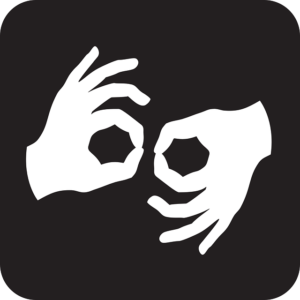
So you’ve planned an event: choose a date, gave it an official name, rented a space, perhaps you rented tables and chairs, and booked speakers or performers. It’s happening! Recognizing the value of creating an inclusive space, you even took the steps to ensure communication access by hiring ASL interpreters. But since so many events are NOT inclusive, how can you get the message out there to the deaf community that they are welcomed at your event?
Placing emphasis on equal access, some organizations now book interpreting services for their events without knowing for sure whether there will be any deaf attendees. These efforts are obviously well-intentioned, but unless d/Deaf/HoH individuals are made aware that the event is happening and that interpreters will be provided, it does not have the kind of impact that it could.
Ways to Promote Inclusive Events to Reach Deaf Audiences
To help event-planners and organizers more effectively reach the d/Deaf community, here are some suggestions for promoting your next inclusive event.
TRADITIONAL MEDIA
There is nothing wrong with using classic advertising outlets to reach deaf audiences, in fact it’s a great idea! When promoting your event in mainstream newspapers, independent papers, in magazines, or on TV, be sure it gets highlighted that interpreters will be provided. Include the logo for ASL interpreter on any graphics. If you send a press kit, place emphasis on importance of inclusion and equal communication access. Make sure any literature about the event includes this information near the top so writers and editors don’t miss it.
LOCAL PROMOTION
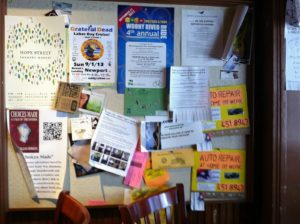 To reach the deaf population within your community, create eye-catching fliers and distribute them in areas that get heavy traffic. Libraries, gyms, coffee shops, community centers or schools (especially schools for the deaf) are good places to start. Make sure your flier prominently includes the fact that ASL interpreters and/or other access will be provided. Try using the logo for ASL interpreter somewhere that it can easily be seen.
To reach the deaf population within your community, create eye-catching fliers and distribute them in areas that get heavy traffic. Libraries, gyms, coffee shops, community centers or schools (especially schools for the deaf) are good places to start. Make sure your flier prominently includes the fact that ASL interpreters and/or other access will be provided. Try using the logo for ASL interpreter somewhere that it can easily be seen.
LOCAL SOCIAL ORGANIZATIONS
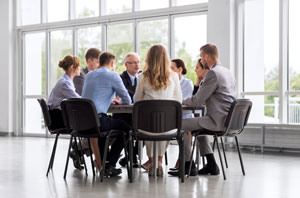 While Deaf Clubs are not as popular as they once were, searching “Deaf Club [your city name]” on the internet may still be an easy way to connect with the local deaf community. If there is a website, social media page, or message board for a local Deaf Club, try reaching out with information about your event. See if you can find the right person to help you distribute the information effectively. You may also want to search “Deaf Events [your city name]” or “Deaf Meetup [your city name],” which is a site popularly used by the community to organize informal gatherings. If you find there is a local group of deaf individuals who get together for coffee, ask if you could drop off some promotional materials at their next meeting. Ask around at any local churches that offer ASL interpreted prayer to see if they have deaf congregation members that might be interested in your event. Or maybe there’s a Deaf yoga group? A little networking can go a long way!
While Deaf Clubs are not as popular as they once were, searching “Deaf Club [your city name]” on the internet may still be an easy way to connect with the local deaf community. If there is a website, social media page, or message board for a local Deaf Club, try reaching out with information about your event. See if you can find the right person to help you distribute the information effectively. You may also want to search “Deaf Events [your city name]” or “Deaf Meetup [your city name],” which is a site popularly used by the community to organize informal gatherings. If you find there is a local group of deaf individuals who get together for coffee, ask if you could drop off some promotional materials at their next meeting. Ask around at any local churches that offer ASL interpreted prayer to see if they have deaf congregation members that might be interested in your event. Or maybe there’s a Deaf yoga group? A little networking can go a long way!
The National Association of the Deaf (NAD) has chapters in every state, as well as active junior chapters in some state — NAD would be a good point of contact if you were organizing a political rally or large public event of that sort. The NAD website has links to state organizations.
SOCIAL MEDIA
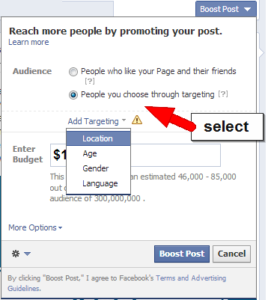 The widespread use of social media has made is easier than ever for individuals who are deaf to stay connected, both with each other and with the majority hearing culture. If you don’t know where to start, Facebook is an excellent tool for promoting your event to the local community. First: create an “Event” page using your brand’s Facebook page, if you have not already done so. Include all the relevant details about the event, and make sure it clearly states that ASL interpreters will be provided. Promote this event on your brand/ organization’s Facebook page on a regular basis to make sure your fans see it. You might want to “pin” the post to the top of you page.
The widespread use of social media has made is easier than ever for individuals who are deaf to stay connected, both with each other and with the majority hearing culture. If you don’t know where to start, Facebook is an excellent tool for promoting your event to the local community. First: create an “Event” page using your brand’s Facebook page, if you have not already done so. Include all the relevant details about the event, and make sure it clearly states that ASL interpreters will be provided. Promote this event on your brand/ organization’s Facebook page on a regular basis to make sure your fans see it. You might want to “pin” the post to the top of you page.
Overall, advertising on Facebook is relatively inexpensive and makes it easy to get your message out there. To test the waters a little bit, try making a “Boosted Post” on your organization’s Facebook page.
- Find or create an appealing graphic to use as your ad. Do NOT use an event flier covered in text because Facebook will not allow you to boost the post if there is too much text on the image. High quality stock images can definitely be used for this purpose, and a small amount of text (perhaps just the event name and date) should be ok.
- Now create an alluring caption for the image that entices people to learn more about what you are doing. This content should include the DATE, TIME, and LOCATION. Copy the Facebook URL for the “Event” page that you already created and then paste it at either the start or end of your caption. Make sure you include this link! I suggest saying something like “Learn More Here: [Event Page Link]”
- Go ahead and post it!
- Click “Boost Post.” In this menu, you can get as specific or broad as you’d like with regards to who the boosted post is seen by. You can narrow it down by city, region, interests, education, and more. Play around with these settings to tailor your audience. Then choose how much money you will spend to boost the post (even $10 or $20 can go a long way), and the duration of time that it will be promoted for. And that should be it!
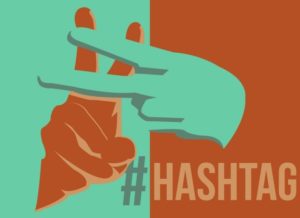 If you have more time and are looking to foster a deeper connection to the deaf online community, try following the #Deaf hashtag for a while, follow deaf individuals, and observe public discussions on all different outlets. Soon, you will be able to start identifying the more active influencers. Engage these individuals, use your own platform to share their messages, and develop a solid repertoire. Then, the next time you have an event to promote, these individuals will be more likely to reciprocate and share your information with their audiences. Investing in these mutually beneficial relationships can be worth it in the long run.
If you have more time and are looking to foster a deeper connection to the deaf online community, try following the #Deaf hashtag for a while, follow deaf individuals, and observe public discussions on all different outlets. Soon, you will be able to start identifying the more active influencers. Engage these individuals, use your own platform to share their messages, and develop a solid repertoire. Then, the next time you have an event to promote, these individuals will be more likely to reciprocate and share your information with their audiences. Investing in these mutually beneficial relationships can be worth it in the long run.
One example of this in NYC would be the Deaf NYC News Facebook page.
THINK OUTSIDE THE BOX
Individuals who are deaf are out there living their lives around you at all times, and they enjoy all sorts of different things— so feel free to get creative with marketing. The “Deaf community” isn’t some stereotype box that people fit neatly into, and “Deaf Clubs” aren’t the only place you’ll find deaf people.
 For example: if you were promoting an upcoming musical event with ASL interpreters, you would want this message to reach deaf music-lovers. Maybe you could contact local college music programs, open mic nights, or music shops to see if they could put the word out there for you, too. If you were organizing an ASL interpreted art event, it might be a good idea to connect with local schools, arts and craft stores, museums, galleries, and prominent local artists to help spread the news. Be sure to emphasize that interpreting services will be provided!
For example: if you were promoting an upcoming musical event with ASL interpreters, you would want this message to reach deaf music-lovers. Maybe you could contact local college music programs, open mic nights, or music shops to see if they could put the word out there for you, too. If you were organizing an ASL interpreted art event, it might be a good idea to connect with local schools, arts and craft stores, museums, galleries, and prominent local artists to help spread the news. Be sure to emphasize that interpreting services will be provided!
Building communication access into your event is a progressive step toward creating an inclusive society. But after so many years of being forgotten about by hearing event organizers, people who are deaf can not safely assume interpreters will be available. When offering equal access for an event, it is important that the promotions and marketing make it clear that ASL interpreting services will be provided.
It is also crucial that news about your event reaches members of the local deaf community. Don’t get discouraged if your first event does not attract dozens of individuals who are deaf. Consistency is key! Over time, as you regularly provide interpreters and advertise communication access, word will spread and your organization will earn a reputation for being deaf-friendly.
SignNexus interpreting services is pleased to offer qualified interpreters in New York City and New Jersey for a wide variety or entertainment or professional events. We make the process for securing interpreters and providing equal access as simple as possible. LCIS offers quality services for deaf consumers with a strong emphasis on client satisfaction.







